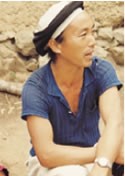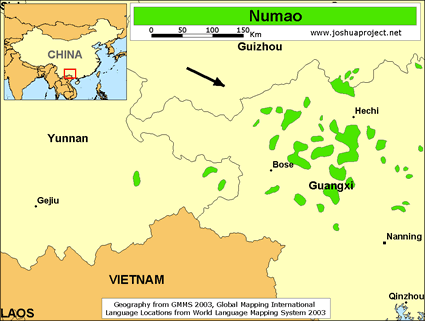The Numao, despite their small size, are known by a variety of different names. Local Han Chinese people call them Heiku Yao, which means "black trouser Yao," after the Numao men's custom of wearing black trousers. One subgroup of the Numao are called the Beidongnuo. The Chinese have found that this small group speak the same language as the Numao. But the Beidongnuo are profiled separately in Operation China because they insist they are a different ethnic group. The Numao are one of eleven distinct tribes of the Bunu people, all of which have been officially included under the Yao nationality by the Chinese authorities.
Long before the start of the Christian era, it is generally believed, the numerous groups belonging to today's Miao, Yao, and She nationalities were part of the same branch of ethnic groups. Chinese accounts place the ancestors of these people in northern China around 500 BC. Persecution forced them to migrate into southern China, especially into the regions that are today's Jiangxi and Hunan provinces. Further conflict forced these groups to splinter into dozens of smaller units who, after centuries of separation from other members of their original people, evolved into distinct ethnolinguistic groups.
Numao culture is similar to that of the Yao who live in the same part of China. They consider Pan Hu to be their progenitor and worship him at certain festivals throughout the year. All Numao are agriculturists, struggling to produce good crops from the poor soil where they live.
In addition to their worship of Pan Hu, the Numao revere and appease a hierarchy of spirits and deities, including the spirit of the soil, and demons, which they believe live inside the highest mountains in their region.
Because of their small size, groups like the Numao tend to be overlooked by the Christian world. There has never been a known follower of Christ from among their tribe. God's Word has promised there will be redeemed representatives from all tribes, including the Numao, around his throne in heaven. Church planters need to view the Numao as an untouched group desperately in need of God, rather than ignore them because of their small numbers.
The Numao people need the guidance and blessings of the King of kings. As it stands, few can even hear his name let alone his voice calling to them.
Pray they come to worship God rather than nature and that the seed of the gospel will bear much fruit.
Pray for the Lord to intervene in their families, calling people to his side.
Pray for their hearts to be drawn to the Lord of lords.
Pray for a church planting movement to thrive in their communities.
Scripture Prayers for the Numao in China.
Operation China, Asia Harvest, Copyrighted © Used with permission.
| Profile Source: Joshua Project |











